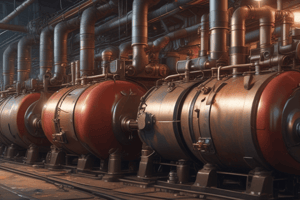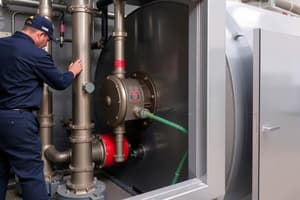Podcast
Questions and Answers
What is the purpose of regular cleaning in boiler maintenance?
What is the purpose of regular cleaning in boiler maintenance?
- To remove soot and scale buildup to maintain efficiency (correct)
- To verify burner operation
- To test pressure relief valves
- To increase the pressure within the boiler
Which type of boiler is typically used for high-pressure applications?
Which type of boiler is typically used for high-pressure applications?
- Electric Boiler
- Combination Boiler
- Water-Tube Boiler (correct)
- Fire-Tube Boiler
What is the main function of pressure relief valves in boiler safety?
What is the main function of pressure relief valves in boiler safety?
- To indicate when maintenance is needed
- To prevent overpressure (correct)
- To reduce soot buildup
- To cool down the boiler system
Which factor is crucial for improving boiler efficiency?
Which factor is crucial for improving boiler efficiency?
What role do safety controls play in a boiler's operation?
What role do safety controls play in a boiler's operation?
What should be a primary consideration for boiler installation?
What should be a primary consideration for boiler installation?
How is the efficiency of a boiler primarily measured?
How is the efficiency of a boiler primarily measured?
What is an important step to take after installing a boiler?
What is an important step to take after installing a boiler?
What is a significant consequence of low water levels in a boiler?
What is a significant consequence of low water levels in a boiler?
Which device alerts operators to dangerously low water levels in a boiler?
Which device alerts operators to dangerously low water levels in a boiler?
What best describes the importance of regular boiler maintenance?
What best describes the importance of regular boiler maintenance?
What action is part of emergency procedures in boiler safety protocols?
What action is part of emergency procedures in boiler safety protocols?
Which of the following is a recommended best practice for boiler safety?
Which of the following is a recommended best practice for boiler safety?
Flashcards are hidden until you start studying
Study Notes
Boiler Maintenance
- Regular Inspections: Check for leaks, corrosion, and other signs of wear.
- Cleaning: Remove soot and scale buildup to maintain efficiency.
- Water Treatment: Use chemicals to prevent corrosion and scale in boiler water.
- Pressure Checks: Regularly monitor pressure gauges to ensure safe operation.
- Burner Maintenance: Verify proper burner operation; clean and adjust as needed.
Boiler Types
-
Fire-Tube Boilers:
- Hot gases pass through tubes surrounded by water.
- Simpler design; typically lower pressure applications.
-
Water-Tube Boilers:
- Water flows through tubes heated by external combustion gases.
- Suitable for high-pressure applications; more efficient.
-
Electric Boilers:
- Use electricity to heat water, often compact and efficient.
- Ideal for smaller installations or where space is limited.
-
Combination Boilers:
- Provide both heating and hot water on demand.
- Compact design, popular in residential settings.
Boiler Safety
- Pressure Relief Valves: Essential to prevent overpressure; regularly test.
- Safety Controls: Automatic shutoff valves for fuel supply and flame monitoring.
- Ventilation: Ensure adequate airflow to prevent carbon monoxide buildup.
- Regular Safety Inspections: Routine checks to comply with safety regulations.
- Emergency Procedures: Develop and practice response plans for boiler failures.
Boiler Efficiency
- Efficiency Rating: Measured by the Annual Fuel Utilization Efficiency (AFUE) percentage.
- Regular Maintenance: Ensures optimal performance and efficiency.
- Insulation: Properly insulate pipes and boiler to reduce heat loss.
- Upgrade Options: Consider high-efficiency models or retrofitting existing boilers for enhanced efficiency.
- Burner Adjustments: Fine-tune the burner for optimal fuel-air mixture for better combustion efficiency.
Boiler Installation
- Location: Must be in a suitable area with proper ventilation and clearances.
- Mounting: Securely mount the boiler to prevent movement; level installation.
- Piping: Follow codes and regulations for water and gas connections.
- User Manual: Always consult the manufacturer’s instructions for specific installation guidelines.
- Testing After Installation: Conduct system tests to ensure proper operation and safety compliance.
Boiler Maintenance
- Regular inspections include checking for leaks, corrosion and wear.
- Clean soot and scale buildup to improve performance.
- Use water treatment chemicals to prevent corrosion and scale build-up in boiler water.
- Regularly monitor pressure gauges to ensure safe operation.
- Clean and adjust burners as needed.
Boiler Types
- Fire-tube boilers have hot gases passing through tubes surrounded by water.
- Fire-tube boilers are simpler in design typically used for lower pressure applications.
- Water-tube boilers have water flowing through tubes heated by external combustion gases.
- Water-tube boilers are suitable for high-pressure applications and are more efficient.
- Electric boilers heat water using electricity.
- Electric boilers are often compact and efficient, ideal for smaller installations or where space is limited.
- Combination boilers provide both heating and hot water on demand.
- Combination boilers are popular in residential settings.
Boiler Safety
- Pressure relief valves are essential to prevent overpressure and should be tested regularly.
- Safety controls include automatic shutoff valves for fuel supply and flame monitoring.
- Ensure adequate ventilation to prevent carbon monoxide buildup.
- Perform regular safety inspections to comply with regulations.
- Prepare emergency procedures to respond to potential boiler failures.
Boiler Efficiency
- Annual Fuel Utilization Efficiency (AFUE) measures boiler efficiency.
- Regular maintenance ensures optimal performance and efficiency.
- Insulate pipes and boilers to reduce heat loss.
- Upgrade to high-efficiency models or retrofit existing boilers to improve efficiency.
- Fine-tune the burner for optimal fuel-air mixture to achieve greater combustion efficiency.
Boiler Installation
- Boiler location needs proper ventilation and clearances.
- Securely mount the boiler to prevent movement and ensure level installation.
- Follow regulations for water and gas connections while installing piping.
- Consult the manufacturer’s instructions for specific installation guidelines.
- After installation, conduct system tests to ensure proper operation and safety compliance.
Boiler Safety Importance
- Boiler safety is crucial for preventing accidents, injuries, and protecting equipment and property.
Common Boiler Hazards
- Overpressure: Excess pressure can lead to explosions.
- Water Level Issues: Low water levels can damage the boiler, while high levels can lead to inefficiencies.
- Heating Surface Failures: Failures can cause steam release, posing burn hazards.
- Corrosion and Scale Buildup: These issues reduce efficiency and increase the risk of safety failures.
Safety Devices
- Pressure Relief Valves: Automatically vent excess pressure, preventing explosions.
- Water Level Controls: Maintain proper water levels to prevent low water hazards.
- Low Water Alarms: Alert operators to dangerously low water levels.
- Temperature Controls: Prevent overheating and potential safety hazards.
Regular Maintenance
- Regular inspections (monthly and yearly) are crucial for ensuring compliance with safety standards.
- Safety device cleaning, testing, and calibration are critical for reliable operation.
- Detecting and addressing leaks and corrosion is essential for long-term safety.
Operator Training
- Comprehensive training in boiler operation and emergency procedures is essential for safe operation.
- Operators must understand safety protocols, equipment, and emergency procedures.
- Regular updates on safety regulations and best practices ensure continued compliance.
Emergency Procedures
- Establish clear protocols for responding to alarms or malfunctions.
- Implement evacuation plans and provide contact information for emergency response teams.
- Conduct regular drills to ensure preparedness for emergency scenarios.
Regulatory Compliance
- Adherence to local and national safety standards (e.g., ASME, OSHA) is mandatory.
- Maintain documentation of safety checks and maintenance records for audit purposes.
Best Practices
- Regularly conduct safety audits to identify potential hazards and areas for improvement.
- Install clear and visible signage near boiler rooms to indicate safety hazards and procedures.
- Ensure appropriate Personal Protective Equipment (PPE) is readily available for operators.
- Foster a strong safety culture among all staff to prioritize safe working practices.
Studying That Suits You
Use AI to generate personalized quizzes and flashcards to suit your learning preferences.




